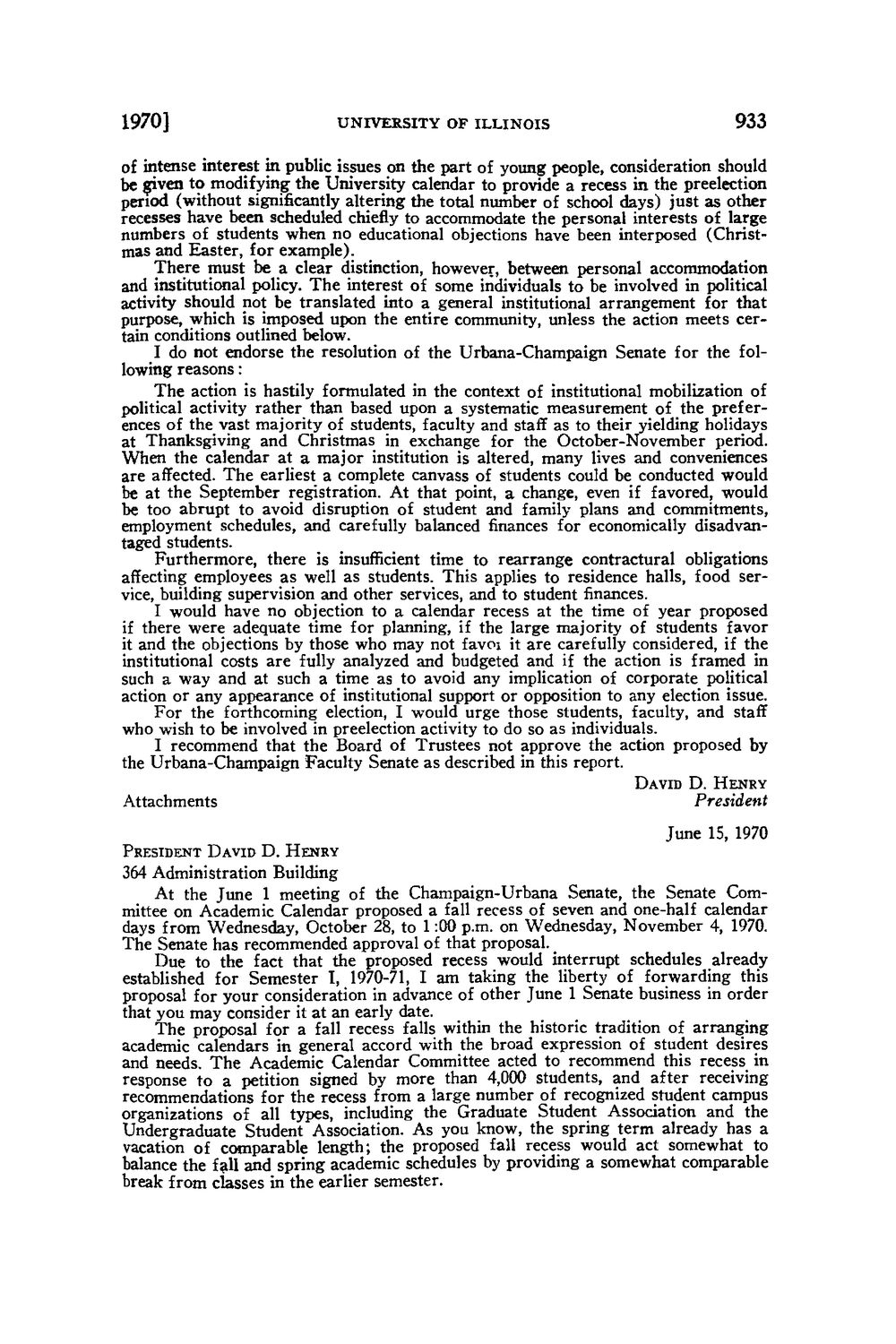| |
| |
Caption: Board of Trustees Minutes - 1970
This is a reduced-resolution page image for fast online browsing.

EXTRACTED TEXT FROM PAGE:
1970] UNIVERSITY OF ILLINOIS 933 of intense interest in public issues on the part of young people, consideration should be given to modifying the University calendar to provide a recess in the preelection period (without significantly altering the total number of school days) just as other recesses have been scheduled chiefly to accommodate the personal interests of large numbers of students when no educational objections have been interposed (Christmas and Easter, for example). There must be a clear distinction, however, between personal accommodation and institutional policy. T h e interest of some individuals to be involved in political activity should not be translated into a general institutional arrangement for that purpose, which is imposed upon the entire community, unless the action meets certain conditions outlined below. I do not endorse the resolution of the Urbana-Champaign Senate for the following reasons: The action is hastily formulated in the context of institutional mobilization of political activity rather than based upon a systematic measurement of the preferences of the vast majority of students, faculty and staff as to their yielding holidays at Thanksgiving and Christmas in exchange for the October-November period. When the calendar at a major institution is altered, many lives and conveniences are affected. T h e earliest a complete canvass of students could be conducted would be at the September registration. At that point, a change, even if favored, would be too abrupt to avoid disruption of student and family plans and commitments, employment schedules, and carefully balanced finances for economically disadvantaged students. Furthermore, there is insufficient time to rearrange contractural obligations affecting employees as well as students. This applies to residence halls, food service, building supervision and other services, and to student finances. I would have no objection to a calendar recess at the time of year proposed if there were adequate time for planning, if the large majority of students favor it and the objections by those who may not favoi it are carefully considered, if the institutional costs are fully analyzed and budgeted and if the action is framed in such a way and at such a time as to avoid any implication of corporate political action or any appearance of institutional support or opposition to any election issue. For the forthcoming election, I would urge those students, faculty, and staff who wish to be involved in preelection activity to do so as individuals. I recommend that the Board of Trustees not approve the action proposed by the Urbana-Champaign Faculty Senate as described in this report. DAVID D. H E N R Y Attachments PRESIDENT DAVID D. H E N R Y President June IS, 1970 364 Administration Building At the June 1 meeting of the Champaign-Urbana Senate, the Senate Committee on Academic Calendar proposed a fall recess of seven and one-half calendar days from Wednesday, October 28, to 1:00 p.m. on Wednesday, November 4, 1970. The Senate has recommended approval of that proposal. _ Due to the fact that the proposed recess would interrupt schedules already established for Semester I, 1970-71, I am taking the liberty of forwarding this proposal for your consideration in advance of other June 1 Senate business in order that you may consider it at an early date. The proposal for a fall recess falls within the historic tradition of arranging academic calendars in general accord with the broad expression of student desires and needs. T h e Academic Calendar Committee acted to recommend this recess in response to a petition signed by more than 4,000 students, and after receiving recommendations for the recess from a large number of recognized student campus organizations of all types, including the Graduate Student Association and the Undergraduate Student Association. As you know, the spring term already has a vacation of comparable length; the proposed fall recess would act somewhat to balance the fall and spring academic schedules by providing a somewhat comparable break from classes in the earlier semester.
| |